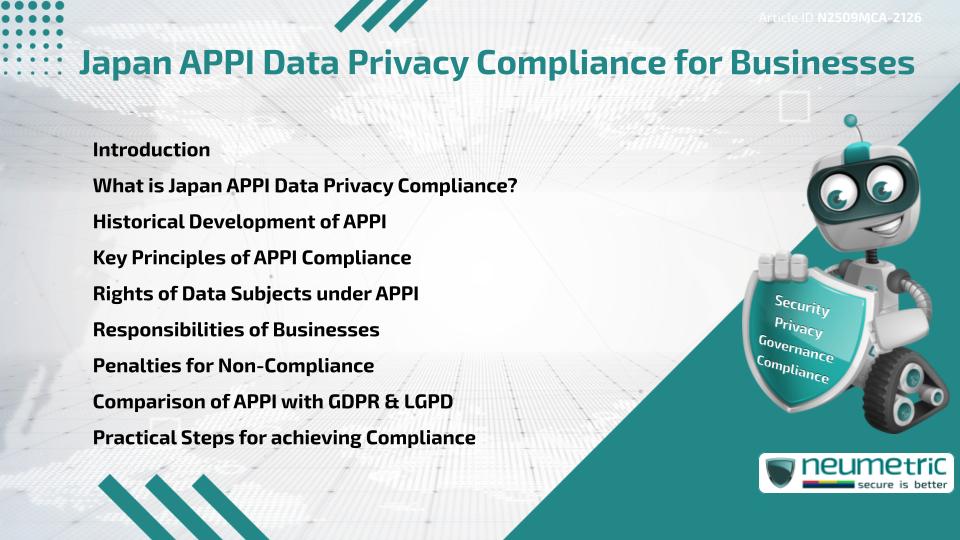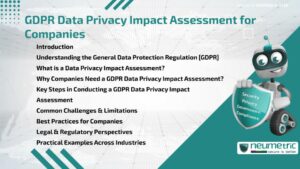Table of Contents
ToggleIntroduction
Japan APPI Data Privacy Compliance refers to how businesses comply with the Act on the Protection of Personal Information [APPI], Japan’s primary Data Protection law. First enacted in 2003 & strengthened through amendments in 2017 & 2022, APPI regulates how Personal Information is collected, used & shared by both domestic & international businesses operating in Japan. It grants rights to individuals, imposes duties on businesses & introduces penalties for violations. Achieving Japan APPI Data Privacy Compliance is essential for maintaining Consumer Trust, protecting Sensitive Information & ensuring Lawful operations in Japan’s highly regulated digital market.
What is Japan APPI Data Privacy Compliance?
Japan APPI Data Privacy Compliance requires businesses to follow the rules set out in the Act on the Protection of Personal Information. This law applies not only to Japanese businesses but also to foreign companies handling data from Japanese citizens. Compliance ensures that businesses adopt lawful, transparent & secure practices when processing Personal Data.
Historical Development of APPI
APPI was introduced in 2003, making Japan one of the first Asian countries to adopt a comprehensive Data Protection law. Over the years, the rise of digital services & global Privacy concerns led to several amendments. The 2017 update brought stricter rules on cross-border data transfers, while the 2022 amendment expanded individual rights & increased penalties for non-Compliance. This evolution reflects Japan’s effort to align with international standards such as the General Data Protection Regulation [GDPR].
Key Principles of APPI Compliance
The foundation of Japan APPI Data Privacy Compliance rests on a few key principles:
- Purpose Specification: Businesses must clearly state why they collect Personal Information.
- Data Minimisation: Only the minimum data required for business purposes should be collected.
- Accuracy & Security: Businesses must keep information accurate & secure.
- Transparency: Individuals must be informed about how their information will be used.
These principles ensure a balance between business needs & individual Privacy rights.
Rights of Data Subjects under APPI
Under Japan APPI Data Privacy Compliance, individuals are granted specific rights, such as:
- The right to access Personal Information held by businesses.
- The right to request corrections of inaccurate or outdated data.
- The right to request suspension of data use or deletion in certain cases.
- The right to be notified when Personal Information is shared with third parties.
These rights empower individuals to control how their information is managed, much like having control over Financial assets.
Responsibilities of Businesses
Businesses must adopt several practices to achieve Japan APPI Data Privacy Compliance. These include:
- Appointing a Data Protection Manager.
- Creating clear internal rules for handling Personal Data.
- Training staff on Privacy requirements.
- Implementing technical safeguards like encryption & secure Access Controls.
- Notifying regulators & affected individuals in the event of a data breach.
Compliance is an ongoing responsibility that requires Continuous Monitoring & Improvement.
Penalties for Non-Compliance
Failure to meet APPI requirements can result in significant penalties. Businesses may face orders from the Personal Information Protection Commission [PPC], which has the authority to investigate & enforce Compliance. Administrative fines, corrective orders & even criminal sanctions may apply. Beyond legal penalties, reputational harm can lead to lost customers & diminished market confidence.
Comparison of APPI with GDPR & LGPD
Japan APPI Data Privacy Compliance shares similarities with both GDPR in Europe & LGPD in Brazil. All three emphasise individual rights, lawful processing & accountability. However, APPI is often considered less prescriptive than GDPR, giving businesses more flexibility. On the other hand, APPI’s amendments bring it closer to GDPR standards, especially regarding cross-border transfers & individual rights. Compared to LGPD, APPI places stronger emphasis on international data transfer controls.
Practical Steps for achieving Compliance
Businesses looking to ensure Japan APPI Data Privacy Compliance should:
- Conduct a Data Audit to identify all Personal Information collected.
- Review Privacy notices & update them for clarity & transparency.
- Establish data retention & deletion Policies.
- Implement breach notification protocols.
- Regularly review & update Security Measures.
Taking these steps helps businesses not only meet legal obligations but also build trust with customers who increasingly value transparency & Data Security.
Takeaways
- Compliance protects both businesses & consumers.
- Transparency & data minimisation are key.
- Penalties for violations include fines & corrective orders.
- Continuous Monitoring ensures long-term Compliance.
- Individuals have strong rights under APPI.
FAQ
What is the purpose of Japan APPI Data Privacy Compliance?
The purpose is to protect Personal Information, safeguard individual rights & ensure businesses handle data responsibly.
What are the penalties for violating APPI?
Penalties include administrative fines, corrective orders & possible criminal sanctions.
How does APPI differ from GDPR?
APPI is less prescriptive than GDPR but has moved closer through amendments, especially concerning cross-border data transfers.
Need help for Security, Privacy, Governance & VAPT?
Neumetric provides organisations the necessary help to achieve their Cybersecurity, Compliance, Governance, Privacy, Certifications & Pentesting needs.
Organisations & Businesses, specifically those which provide SaaS & AI Solutions in the Fintech, BFSI & other regulated sectors, usually need a Cybersecurity Partner for meeting & maintaining the ongoing Security & Privacy needs & requirements of their Enterprise Clients & Privacy conscious Customers.
SOC 2, ISO 27001, ISO 42001, NIST, HIPAA, HECVAT, EU GDPR are some of the Frameworks that are served by Fusion – a SaaS, multimodular, multitenant, centralised, automated, Cybersecurity & Compliance Management system.
Neumetric also provides Expert Services for technical security which covers VAPT for Web Applications, APIs, iOS & Android Mobile Apps, Security Testing for AWS & other Cloud Environments & Cloud Infrastructure & other similar scopes.
Reach out to us by Email or filling out the Contact Form…





